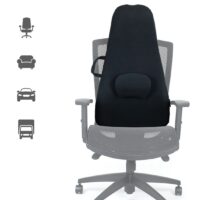Posture
Article by John Miller


Posture: A Key to Better Health and Confidence
What is Good Posture?
Good posture isn’t just about standing tall; it’s about aligning your body against gravity with minimal strain while standing or sitting. Training your body to maintain such positions not only improves your appearance and energy levels but also boosts confidence, prevents injuries, and alleviates pain.
Read more:
Steps to Enhance Posture
Improving posture requires altering habits ingrained in our muscle memory. Whether you’re sitting, standing, walking, or moving, your body follows these learned patterns. Thus, unlearning habits like slouching is crucial for posture correction.
Read more:

The Role of Posture Assessment
The journey to better posture begins with an assessment by a physiotherapist. They pinpoint posture deficits and develop a tailored, effective correction plan.
Key Strategies for Good Posture
Loosen Stiff Spinal Joints:
It’s vital to loosen stiff spinal joints for proper alignment.
Normalise Muscle Length:
Stretching and relaxing muscles is essential, as tight muscles impede good posture.
Build Muscle Strength:
Strong muscles are necessary to maintain correct posture. Targeted exercises can help here.
Boost Muscle Endurance:
Good posture requires muscles that can perform sustained work.
Maintain Normal Nerve Extensibility:
Ensuring your neural tissue is sufficiently flexible supports healthy posture. Avoid directly stretching nerves; consult a physiotherapist for safe methods.
Improve Spatial Awareness:
Knowing your body’s position in space is key. Your physiotherapist can provide feedback and tools like postural taping or braces.
Establishing New Habits:
The hardest part is the initial change. But once you establish correct habits, they become your new normal.
Posture Correction Tools
Your physiotherapist might suggest flexibility treatments, posture exercises, posture taping, or even a posture corrector brace to help retrain your muscles. Posture supports, like lumbar supports and rolls, are passive devices that provide a support system for maintaining proper posture, especially when sitting.
Read more:
Achieving Good Posture Quickly
Consult a physiotherapist to understand your unique posture style and get hands-on treatment, posture exercises, and product recommendations for improvement. Remember, it’s never too late to start, but changing old habits can be challenging.
Read more:
The Importance of Good Posture
Good posture is more than just looking confident. It’s crucial for overall health. Poor posture can lead to chronic pain, reduced lung capacity, and even digestive issues. Recent research highlights the link between posture and mental health, with improved posture leading to better mood and self-esteem.
Correcting Poor Posture
Addressing poor posture involves a multifaceted approach:
Posture Exercises:
Incorporating specific exercises like stretching, strengthening, and core workouts.
Ergonomics:
Adapting your work and living environments to support good posture. Read more: Ergonomics
Mindfulness:
Being aware of your posture throughout the day.
Regular Physiotherapy Sessions:
Professional guidance can accelerate your journey to better posture.
Conclusion: Your Posture Matters
Good posture is a fundamental aspect of your health and well-being. It’s not just about aesthetics; it’s about how your body functions and feels. By understanding the importance of posture and taking active steps to improve it, you’re investing in a healthier, more confident you.
Remember, improving your posture is a journey, and your physiotherapist is your ideal partner in this journey. They can provide personalised advice, corrective exercises, and support to help you achieve and maintain good posture.
For more information or to start your posture improvement journey, don’t hesitate to consult a physiotherapist. They’re equipped with the knowledge and tools to guide you towards better posture and, consequently, better health.
Rochedale - Call 38410277
Book Online: RochedaleSalisbury - Call 32751044
Book Online: SalisburySandgate - Call 32691122
Book Online: SandgateArticle by John Miller
Posture FAQs


Your Guide to Better Posture
Maintaining good posture is crucial for overall health and well-being. Poor posture can lead to a host of issues, including back pain, reduced mobility, and even long-term health problems. This FAQ page addresses common questions about posture, providing insights and tips to help you improve your posture and enhance your quality of life.
Why is Good Posture Important?
Good posture helps you stand, walk, sit, and lie in positions that place the least strain on supporting muscles and ligaments. It keeps bones and joints in correct alignment, reducing the risk of injury and discomfort. Learn more about the benefits and reasons for maintaining good posture in the following articles:
- Why Posture Matters: Discusses the significance of good posture and its impact on overall health.
- Health Benefits of Good Posture: Explains the various health benefits of maintaining correct posture.
- Posture and Pain Prevention: Highlights how good posture can prevent common aches and pains.
How to Improve Your Posture?
Improving your posture involves strengthening the muscles that support your spine and developing new habits for standing, sitting, and lying down. Here are some practical steps and exercises to help you improve your posture:
- Posture Exercises: A list of exercises specifically designed to improve posture.
- Tips for Better Posture: Practical tips and techniques to incorporate into your daily routine.
- Ergonomic Advice: Guidance on how to set up your workspace and living areas to support good posture.
What Are the Effects of Poor Posture?
Poor posture can lead to various negative health outcomes, including chronic pain, reduced flexibility, and even respiratory issues. Understanding these effects can motivate you to make positive changes:
- Consequences of Poor Posture: Details the health risks associated with poor posture.
- Posture and Back Pain: Explains the connection between poor posture and back pain.
- Posture and Overall Health: Discusses how poor posture affects various aspects of your health.
Who Can Help with Posture Improvement?
Physiotherapists are trained to assess posture and develop customised treatment plans to improve it. Learn more about how a professional can help:
- Physiotherapy for Posture Improvement: Explains the role of physiotherapy in enhancing posture.
- Choosing the Right Physiotherapist: Fnding a physiotherapist who has a special interest in posture correction.


Conclusion
Improving and maintaining good posture is essential for your overall health. By following the tips and exercises provided, you can reduce pain, enhance your physical performance, and prevent future health problems. If you need professional help, don't hesitate to consult a physiotherapist.
Rochedale - Call 38410277
Book Online: RochedaleSalisbury - Call 32751044
Book Online: SalisburySandgate - Call 32691122
Book Online: SandgatePosture FAQs
- Why is good posture important? Good posture keeps bones and joints in correct alignment, reducing the risk of injury, pain, and long-term health problems. It also improves breathing and circulation.
- How can I improve my posture? You can improve your posture by doing specific exercises, being mindful of your body positions, and setting up an ergonomic workspace. Regular check-ups with a physiotherapist can also help.
- What are the signs of poor posture? Common signs include rounded shoulders, a forward head position, and back or neck pain. You may also experience fatigue and reduced flexibility.
- Who can help me with my posture? A physiotherapist can assess your posture and create a personalised treatment plan. They can teach you exercises and techniques to improve your posture.
- Where can I find resources to improve my posture? Resources are available on the PhysioWorks website, including articles on posture exercises, tips for better posture, and ergonomic advice.
- When should I seek professional help for my posture? If you experience persistent pain, discomfort, or find it challenging to maintain good posture on your own, consult a physiotherapist.
Follow Us for Free Tips
Stay updated with the latest tips on posture and overall health by following us on our social media platforms. We regularly share practical advice, exercises, and health information to help you maintain good posture and improve your well-being. Don't miss out on valuable insights!
Related Articles
- Back Pain – Causes, Treatment & Prevention Discover the common causes of back pain and effective treatment options.
- Neck Pain – Causes, Treatment & Prevention Learn about neck pain causes and how to treat and prevent it.
- Ergonomics: How to Set Up Your Workspace Tips for creating an ergonomic workspace to support good posture.
- Core Strengthening Exercises for Better Posture Strengthening your core can significantly improve your posture.
- Lumbar Support: Benefits and Best Products Explore the benefits of lumbar support and top product recommendations.
- Yoga for Posture Improvement Incorporate yoga poses into your routine to enhance your posture.
- Pilates for Posture Correction Pilates exercises that focus on posture correction and alignment.
- The Importance of a Proper Mattress for Posture How choosing the right mattress can support your spine and improve posture.
- Tips for Reducing Desk Job-Related Posture Issues Address common posture issues related to long hours at a desk job.
- Stretching Routines to Improve Flexibility and Posture Incorporate stretching routines to enhance flexibility and support better posture.
- Mayo Clinic: Posture Matters: Explains the importance of good posture and how to achieve it.
- Harvard Health: Tips to Improve Your Posture: Offers practical tips for better posture.
- WebMD: The Importance of Posture: Discusses why posture is crucial and how to maintain it.
Each of these articles provides valuable insights and practical tips to help you maintain and improve your posture, ensuring you stay healthy and comfortable.

























